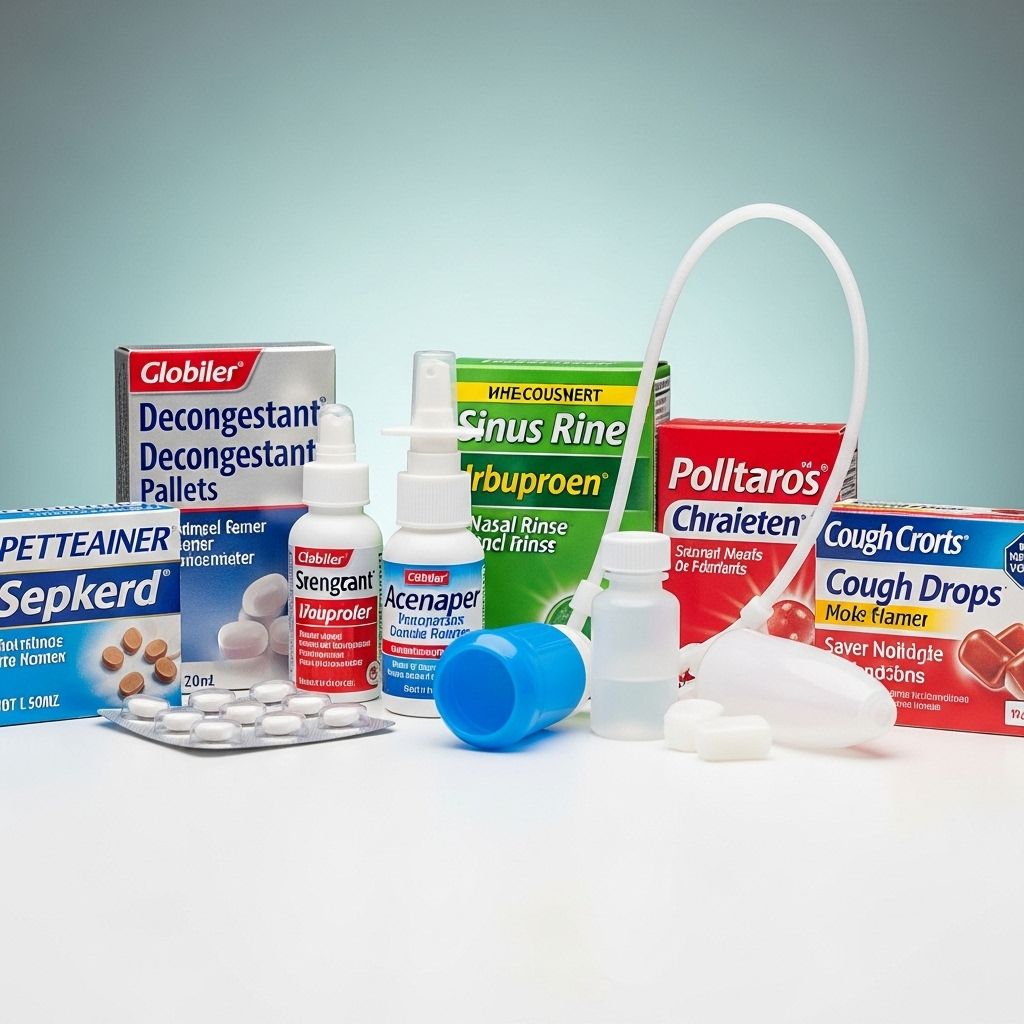Sinus Infection Remedies Over the Counter
Find relief from sinus infections with effective over-the-counter remedies

Sinus Infections and OTC Remedies
Sinus infections, also known as sinusitis, occur when the air-filled spaces inside your sinuses become inflamed and filled with fluid. This can be caused by viruses, bacteria, or allergies, leading to symptoms like facial pain, headache, stuffy nose, runny nose, and postnasal drip. While antibiotics are necessary for bacterial infections, over-the-counter (OTC) remedies can effectively manage symptoms and make you feel more comfortable during the recovery process.
Types of OTC Remedies
Here are some of the most effective OTC remedies for sinus infections:
1. Pain Relievers
Pain relievers such as Tylenol (acetaminophen), Advil or Motrin (ibuprofen), and Aleve (naproxen) can help alleviate headaches and facial pain caused by sinus infections. Always follow the package instructions for dosage and consult a healthcare professional if you have underlying health conditions or take other medications.
2. Decongestants
Decongestants reduce swelling in the nasal passages, providing relief from stuffiness, facial pain, and pressure. They are available as oral medications or nasal sprays. However, oral decongestants should be used with caution, especially if you have high blood pressure or heart conditions.
3. Nasal Strips
Nasal strips can manually help open the nasal passages by applying adhesive strips to the bridge of the nose. This can improve airflow and reduce congestion.
4. Antihistamines
Antihistamines are beneficial for sinus infections caused or exacerbated by allergies. They work by blocking histamine release, which can cause stuffiness, runny nose, and itchy eyes. Common antihistamines include Claritin, Zyrtec, and Benadryl.
5. Nasal Sprays
Over-the-counter steroid nasal sprays, such as Flonase (fluticasone) and Nasacort (triamcinolone), are effective at reducing inflammation in the nasal passages and sinuses. They are usually used once per day and are generally safe for most people.
Home Care and Lifestyle Changes
Beyond OTC medications, several home care and lifestyle changes can help alleviate sinus infection symptoms:
–
Hydration:
Drinking plenty of fluids helps thin out mucus, making it easier for the sinuses to drain naturally. Hot beverages like tea or soup can also provide relief.-Nasal Rinses:
Using a Neti pot or bulb syringe with saline solution can help clear nasal passages by removing mucus and reducing congestion. Always use sterile or distilled water to avoid introducing bacteria.-Humidifiers:
Adding moisture to the air with a humidifier can soothe the nasal passages and help prevent dryness.-Elevated Rest:
Resting with your head elevated can help reduce congestion by allowing mucus to drain more easily.-Avoid Irritants:
Stay away from allergens and irritants like tobacco smoke, strong odors, or pollutants.When to See a Doctor
While OTC remedies can manage symptoms, it’s important to consult a healthcare professional if you experience severe symptoms, if the infection persists, or if you suspect a bacterial infection. This is especially important if you’re unsure about the type of infection or the best course of treatment.
Frequently Asked Questions (FAQs)
Q: Are all sinus infections treatable with OTC medications?
A: No, not all sinus infections are treatable with OTC medications alone. Bacterial infections may require prescription antibiotics, but OTC medications can help manage symptoms.
Q: Can sinus infections be prevented?
A: While not all sinus infections can be prevented, maintaining good hygiene, avoiding allergens, and using nasal rinses regularly can reduce the risk.
Q: How long do sinus infections typically last?
A: Sinus infections can last anywhere from a few days to several weeks, depending on the cause and severity. If symptoms persist, consult a healthcare professional.
Q: Can children use OTP sinus medications?
A: Always consult a healthcare professional before giving children any OTC medications, as some may not be suitable for children or may require special dosage instructions.
Conclusion
Over-the-counter remedies can be an effective way to manage sinus infection symptoms, but it’s crucial to understand that they do not cure the infection itself. Combining these remedies with good home care and consulting a healthcare professional if symptoms persist can help you recover more effectively.
References
- https://www.unitypoint.org/news-and-articles/5-best-ways-to-treat-a-sinus-infection
- https://www.goodrx.com/conditions/sinus-infection/best-otc-sinusitis-medication
- https://nyulangone.org/conditions/chronic-sinusitis/treatments/over-the-counter-therapies-medications-for-chronic-sinusitis
- https://www.mayoclinic.org/diseases-conditions/acute-sinusitis/expert-answers/acute-sinusitis/faq-20058562
- https://myhealth.alberta.ca/Health/pages/conditions.aspx?hwid=hw67214
- https://ascentist.com/resources/patient-health/sinus-pain-over-the-counter-medications/
- https://www.allinahealth.org/healthysetgo/heal/ten-home-remedies-to-relieve-sinus-pain-and-pressure
- https://www.walgreens.com/q/sinus+infection+medications
- https://www.cdc.gov/sinus-infection/about/index.html
- https://www.medicalnewstoday.com/articles/324743
Read full bio of medha deb








